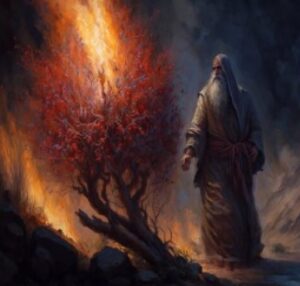Prophet Musa (Moses) stood in disbelief as the sight before him unfolded. Despite the divine warning that his people would face severe consequences for their transgressions, their worship of the golden calf left him filled with shame and righteous anger. How could those who had witnessed the grandeur and power of Allah fall into such blatant disobedience?
Allah had informed Musa of their wrongdoing:
“Indeed, We have tested your people in your absence, and As-Samiri has misled them.” (Quran 20:85).
When Musa returned to his people, his heart was heavy with sorrow and fury. He confronted them, saying:
“O my people, did your Lord not promise you a fair promise? Was the time too long for you, or did you desire that wrath should descend from your Lord upon you, so you broke your promise to me?” (Quran 20:86).
Musa’s anger was then directed at his brother Harun (Aaron). Grabbing him by his beard and head, Musa demanded an explanation for his inaction. Harun pleaded for understanding, explaining that he had tried to prevent their misguidance, but the people had become rebellious, threatening his life. Harun implored Musa not to let the idolaters cause division between them.
Musa’s trust in Allah’s justice was affirmed when Allah swiftly dealt with As-Samiri. Musa said to him:
“Depart! Indeed, for you in this life is to say, ‘No contact.’ And indeed, you have an appointment [in the Hereafter] you will not fail to keep. And look at your ‘god’ to which you remained devoted—we will surely burn it and blow it into the sea as ashes.” (Quran 20:97).
Severe Punishment and Divine Forgiveness
Allah’s retribution for the idolatry was severe but just. Musa conveyed Allah’s command to the Children of Israel:
“O my people, you have wronged yourselves by your worship of the calf, so repent to your Creator and kill yourselves. That is better for you in the sight of your Creator.” (Quran 2:54).
Though the punishment was harsh, it was a means of purification. Allah, in His infinite mercy, accepted their repentance and restored His favor upon them. Despite their repeated disobedience, Allah continued to guide them.
The Elders’ Arrogance
To further atone, Musa selected seventy of the most pious elders from among the Children of Israel and led them to Mount Tur. They sought to apologize for their collective sins, but when Musa returned from speaking with Allah, the elders demanded:
“O Musa, we will never believe you until we see Allah outright.” (Quran 2:55).
Their arrogance resulted in their immediate punishment. A violent earthquake struck, and the elders were killed by a divine lightning bolt. Musa, distressed by their demise, pleaded with Allah:
“My Lord, if You had willed, You could have destroyed them and me before this. Would You destroy us for what the foolish among us have done? This was Your trial, by which You misguide whom You will and guide whom You will. You are our Protector, so forgive us and have mercy upon us. And You are the best of forgivers.” (Quran 7:155).
In response to Musa’s sincere supplication, Allah revived the seventy elders, showcasing His boundless mercy once again.
The Trials and Death of Prophet Musa
The trials of Prophet Musa did not cease. The Children of Israel wandered in the wilderness for years, frequently defying him. Their belligerence and ingratitude weighed heavily on Musa, yet he remained steadfast in his devotion to Allah.

When Harun passed away, Musa lost his closest ally. Alone, he continued to guide the stubborn and rebellious Children of Israel, who still struggled to recognize the blessings bestowed upon them. Despite his relentless efforts, Musa passed away without entering the Promised Land.
According to the traditions of Prophet Muhammad (peace be upon him), Musa’s death was marked by an extraordinary encounter with the Angel of Death. When the angel approached, Musa struck him, resisting the inevitability of death. The Angel returned to Allah, who sent him back with an offer:
“Place your hand on the back of an ox. For every hair that comes under it, you will be granted one year of life.”
Musa asked, “What happens after that?” When told that death would still come, Musa replied, “Let it come now.” He requested to die near the Holy Land, just within a stone’s throw of it.
Legacy of Prophet Musa
Prophet Musa’s life was a testament to unwavering faith, resilience, and patience. Despite enduring countless hardships, he remained devoted to Allah’s command, serving as an example for generations to come. His story reminds us of the boundless mercy of Allah and the importance of steadfastness in the face of adversity.


